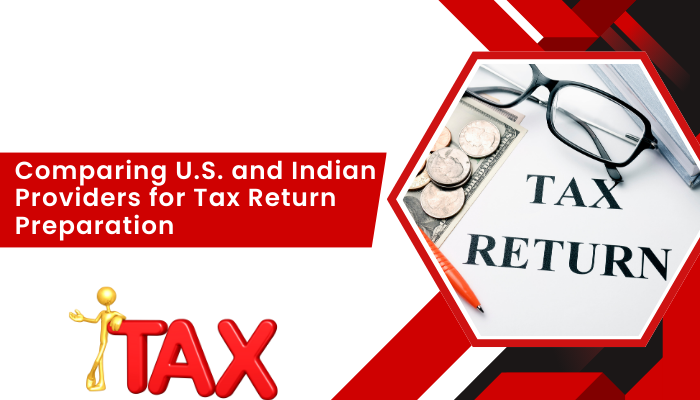Filing taxes isn’t anyone’s favorite activity, yet it’s a vital one. Whether you’re a small business owner, a busy professional, or managing multiple sources of income, choosing the right provider for tax return preparation can significantly influence your financial outcomes and peace of mind. With the rise of global outsourcing, the debate often boils down to choosing between U.S.-based and Indian providers.
Each comes with unique strengths and drawbacks; what matters is how well they align with your individual or business tax needs.
Understanding Tax Return Preparation Services
Tax return preparation involves more than just form-filling. It encompasses the accurate assessment of income, deductions, and credits to minimize liability and ensure compliance with local tax laws. Services can range from basic 1040 filings to complex corporate tax structuring and international reporting.
Key Differences Between U.S. and Indian Tax Professionals
While both U.S. and Indian providers are proficient in offering tax services, their approaches and advantages differ due to regulatory, economic, and operational landscapes.
Expertise in U.S. Tax Code
U.S.-Based Providers:
- Typically consists of Certified Public Accountants (CPAs) and Enrolled Agents.
- Licensed under IRS guidelines, witha deep understanding of state-specific tax codes.
- Well-versed in latest IRS updates, legislative changes, and audit procedures.
Indian Providers:
- Often include Chartered Accountants (CAs) trained in international tax standards.
- As a result of global outsourcing demands, many professionals specialize in U.S. tax laws.
- Work under supervision or partnership with U.S.-licensed firms to ensure compliance.
Cost Considerations: Value for Money or Budget-Friendly?
U.S.-Based:
- Higher hourly rates due to local labor costs, ranging from $150 to $500+, depending on complexity.
- Often includes face-to-face consultation, which adds to service value.
Indian-Based:
- Offer services at a fraction of the cost, typically $30 to $100/hour.
- Attractive for businesses or individuals managing bulk returns or repeated filings.
Turnaround Time and Accessibility
U.S.-Based:
- Immediate accessibility with same-day consultations or urgent support.
- Easy to schedule in-person meetings or phone calls during local business hours.
Indian-Based:
- Leverage time zone differences for faster turnaround, and work completed overnight for U.S. clients.
- Rely on email and virtual meetings, which may cause slight delays in communication but are streamlined in mature firms.
Compliance and Risk Management
Compliance is the cornerstone of tax services. Penalties for inaccuracies can be severe.
U.S. Providers:
- Directly accountable to IRS regulations.
- Insured and bonded with malpractice coverage.
Indian Providers:
- Must work under U.S. firm guidelines or with oversight when filing returns.
- Increasingly compliant, with top-tier firms certified in ISO standards and U.S. tax protocols.
Technology and Data Security
U.S.-Based Providers:
- Often use IRS-approved software with bank-grade security.
- Subject to U.S. privacy laws like the Gramm-Leach-bliley Act.
Indian Providers:
- Leading firms implement end-to-end encryption and GDPR-compliant platforms.
- Cloud-based storage with restricted access; risk is minimized, but still a top concern for some clients.
Pros and Cons Summary Table
| Criteria | U.S. Providers | Indian Providers |
|---|---|---|
| Cost | High | Affordable |
| Expertise | High (Licensed CPA/EA) | Moderate to High (Often via partnerships) |
| Speed | Standard | Faster turnaround due to time zone difference |
| Data Security | Strong domestic protection | Secure, but perception of risk lingers |
| Regulatory Accountability | Direct and local | Indirect; often via U.S. firm contracts |
| Communication | In-person and remote | Mostly remote via email or Zoom |
Use Cases: When to Choose Each Provider
Ideal for U.S.-Based Providers:
- Complex returns involving multiple states.
- Situations requiring IRS audit support.
- Businesses prefer in-person consultation.
Ideal for Indian Providers:
- High-volume return preparation.
- Cost-sensitive individuals or startups.
- Outsourcing firms need backend tax processing.
Ethical and Legal Considerations
Legally, only U.S.-licensed professionals can sign and represent tax returns before the IRS. Hence, even Indian providers must collaborate with U.S.-registered CPAs or EAs. Clients should verify licensing and oversight mechanisms before engagement.
Communication Styles and Cultural Expectations
Smooth collaboration depends heavily on mutual understanding and clarity.
U.S. Firms:
- Prioritize brevity, clarity, and directness in communication.
- Less flexible with changes close to deadlines.
Indian Firms:
- Emphasize detailed documentation and process-oriented steps.
- Often more accommodating in revisions, given service-based business models.
Client Testimonials and Reputation
U.S. Providers:
- Transparent reviews on Google, Yelp, and Better Business Bureau.
- Easier to hold accountable legally in case of disputes.
Indian Providers:
- Reputation built on third-party referrals, Clutch.co ratings, and B2B platforms.
- May require more due diligence to verify authenticity.
Final Thoughts
When it comes to tax return preparation, the best provider is one that aligns with your budget, complexity of returns, and desired level of involvement. While Indian providers offer affordability and efficiency, U.S. firms deliver proximity and personalized accountability.
In fact, many clients now opt for a hybrid approach, outsourcing tax return preparation to India while working with a U.S.-based CPA to finalize and file returns. This balances cost, quality, and compliance effectively.
Click here to read more articles: todayigosolar.com

